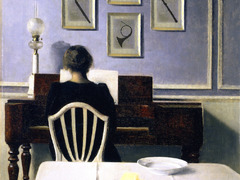Profil
- Activité principale
- Musicien
- Genre(s)
- Classical
- Langues
- Activité secondaire
- Sous-genre(s)
- Instrumental
Profil personnel
The Quintet Scharfes Es consists of highly professional musicians who collaborate with major Italian musical institutions ( Philharmonic Orchestra of the Teatro alla Scala, Orchestra del Teatro dell'Opera di Roma, Orchestra of The Musical Afternoons, Orchestra of Padua and Veneto, Italian string Orchestra, Orchestra del Teatro Bellini in Catania, Orchestra del Teatro Lirico di Cagliari, Italian International Orchestra, etc.) with conductors and soloists such as D.Harding, M.Turkovic, H.Schellenberger, E.Inbal, S.Kuijken, A.Marcon, D.Renzetti, M.Brunello, and with the baroque and classical orchestras such as the Orchestra of Athens Kamerata, Baroque Orchestra of Patras, Venice Baroque Orchestra, the Sonatori de la Gioiosa Marca, Silete Baroque Orchestra Winds, Baroque Orchestra of Bologna, Accademia Barocca " W.Hermans " in major theaters such as the Konzerthaus in Vienna, the " Megaron mousiki " and ' " Onassis Centre" in Athens. They have participated in important exhibitions of Italian early music such as " music festival Malatesta " in Rimini, " Festival of Early Music " of Urbino, " Festival della Valle d' Itria " of Martina Franca, " Sizes and wonders " in Modena, " Ravenna Festival "," MITO September Music " in Turin, " Accademia Filarmonica di Rovereto "," Fondazione Levi " in Venice, " Season of the Academy Byzantine " in Ravenna, and foreign," Resonances " Wienerkonzerthaus (Austria), " Festival Brezice " (Slovenia), " Holland Festival Oude Muziek " Utrecht (Netherlands), " RadioKulturhaus " in Vienna (Austria), " Maj z Muzyka Dawna " in Wroclaw (Poland). They recorded for the labels Deutsche Grammophon, Amadeus, Fonit Cetra, Naxos, New Era, Stradivarius, Dynamic, Classic Voice Antiqua, RAI Trade, MDG Recording and performed live radio broadcasts for RAI 3 and the Austrian ORF ( Österreichischer Rundfunk ).
Profil de l'entreprise
The Quintet Scharfes Es stands for precious and rare distinction of making their philological running on period instruments. This research stems from the need to rediscover the historic musical sounds and tone colors typical of late classicism, in particular of that historical period that lies between the end of the rationality of the Enlightenment and the first stirrings of romance. A research made possible only through the use of period instruments (originals and copies) that are different from the modern ones not only in an aesthetic and visual materials of construction and physical structure but also with regard to pitch, loudness and timbre. This also allows you to reflect the will of the composer reconstructing the original appearance of these wonderful masterpieces. We must not forget that every melodic line, every choice of timbre, each harmonic approach was determined by the unique characteristics of the instrument at the time. A fascinating way to allow the listener to relive, acoustically and visually, unrivaled sound and atmosphere of the past.



